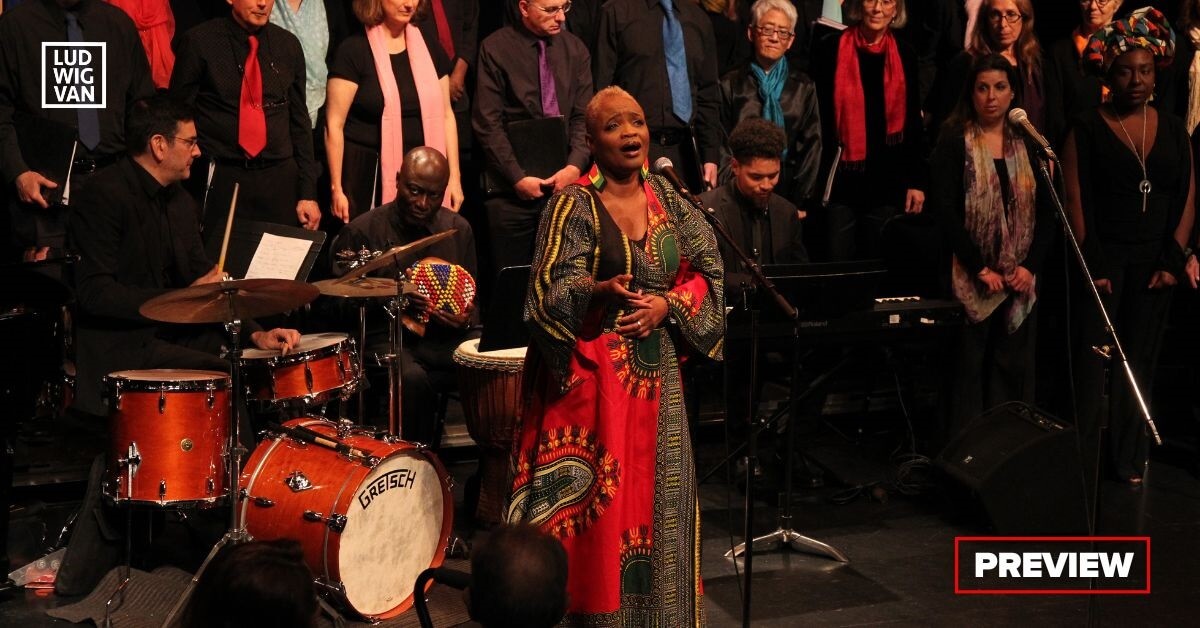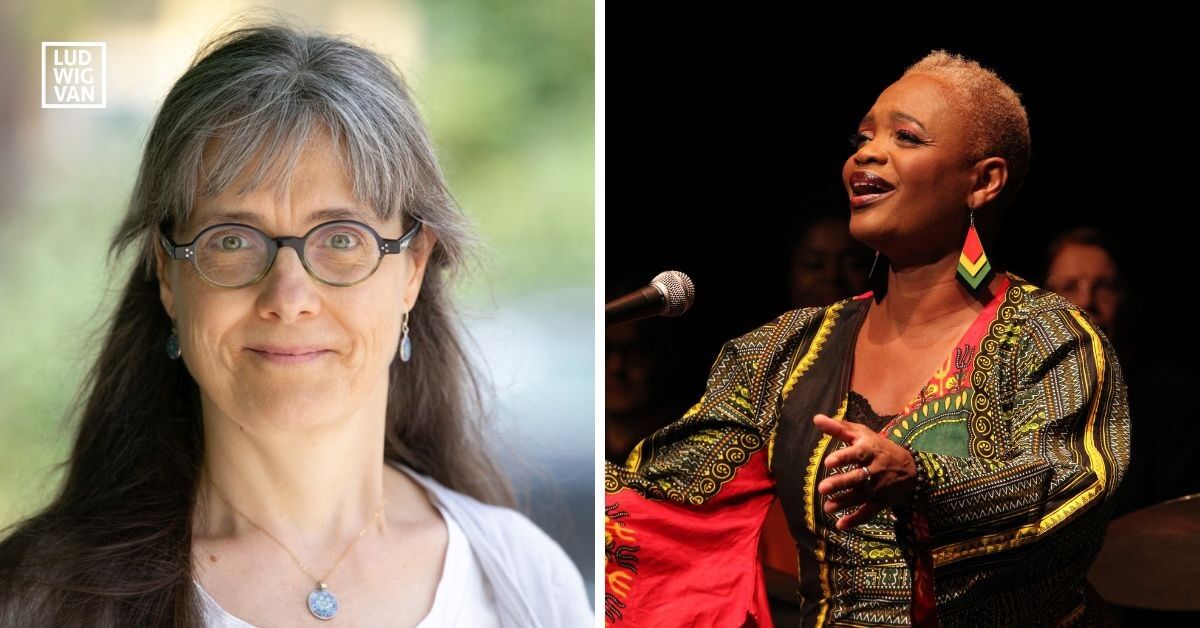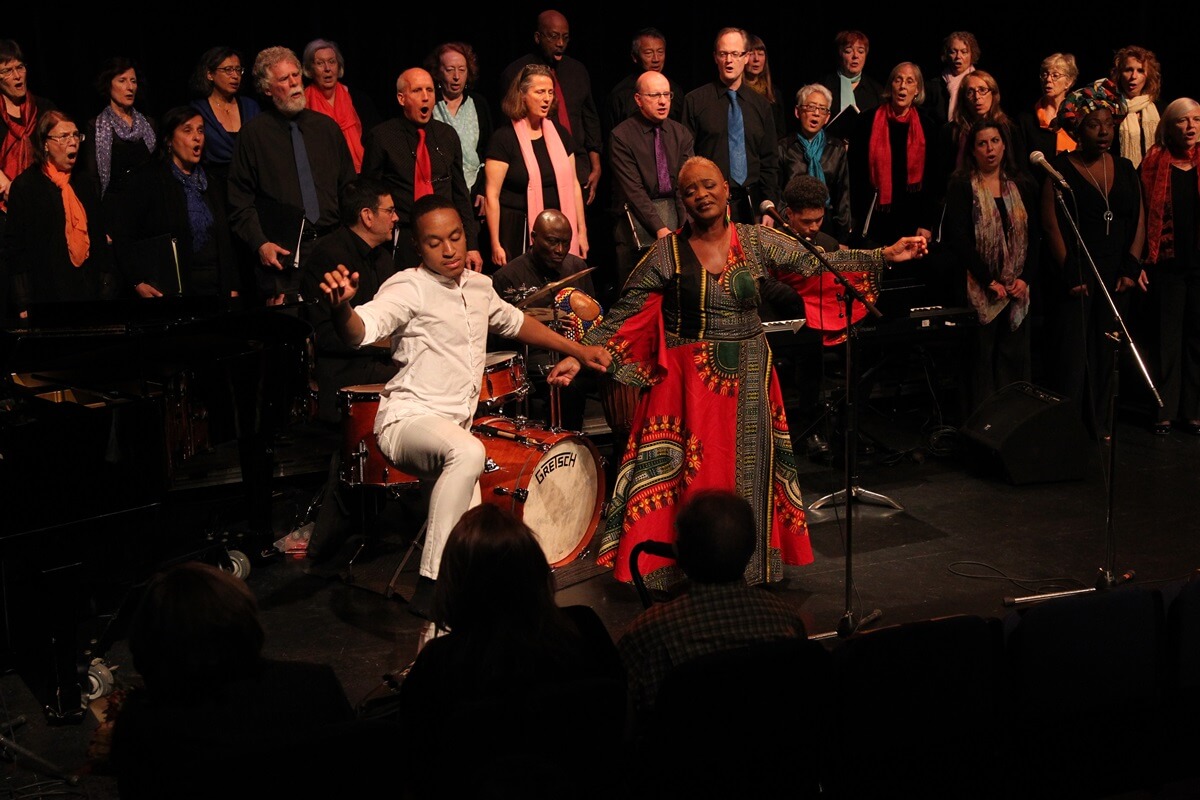
Roots and Intersections, the next concert by Toronto’s Jubilate Singers, is a collaboration with soprano Denise Williams in exploring the common ground between the music of African, Jewish, and Muslim traditions. The concert takes place March 4, with a preview talk and performance on February 19.
Along with Denise Williams, artists on the program will include Marilyn Lerner on piano, Ben MacDonald on tenor sax and woodwinds, African percussionist Sam Donkoh, multi-instrumentalist and vocalist Waleed Abdulhamid, percussionist Daniel Barnes and pianist Brahm Goldhamer, along with members of the Jubilate Singers, and Isabel Bernaus, their conductor. Producer, artist and composer Darryl Joseph-Dennie will play keyboards.
We caught up with Isabel Bernaus and Denise Williams to talk about Roots and Intersections: The musical intersections of the Black, Jewish, and Muslim Diasporas.

Musical intersections
For soprano and music educator Denise Williams, presenting and performing music that represents the multicultural city of Toronto she largely grew up in wasn’t much of a stretch. While her study was devoted to classical repertoire, she had already sung in a Polish as well as a Jewish choir early in her career. “I’m Canadian,” she says. “I’m quite a diverse person.”
She also grew up during a period where there was much public discussion, and often furor, over race-related issues in Toronto. That includes the world of theatre and performance, where issues such as racial stereotypes and representation were often swept under the rug. “It was just about getting a role,” she recalls.
When it comes to the music, there are certainly commonalities that we share across Canada, as she points out. However, there were distinctive links between the diasporas of the Black, Jewish, and Muslim communities.
Conductor Isabel Bernaus became conductor of the Jubilate Singers, an organization with a 50-plus-year history, in 2001. “Since I started conducting in 2001, we started with world music.” She recalls coming to Canada from Barcelona as an immigrant, bringing the music of her homeland with her.
With Jubilate, it’s about learning the music with a conscience. “We want to learn them properly. We want to learn the language, and respect the culture.” She is also conscious of Toronto’s population. “To make art in a city full of art that is representative of the cultures,” she explains, “it’s our specialty.”
Collaborating with other artists and organizations is also a natural extension of the principle. Her link with Denise dates back years before their first collaborative concert in 2018. “It was a true collaboration on many levels.”
Brahm Goldhamer, a noted collaborative pianist and vocal coach as well as performer, and one of the performers, is a common link. “We started a concert together called Black and Jewish in 1995,” Denise recalls. “He’s been my colleague and collaborator ever since.”
To their backgrounds in art song, the mix of artists adds elements of improv and jazz in a blend of styles, genres and moods.
Sam Donkoh was a connection to Ghanaian music that Denise has known and collaborated with for years. “I wanted to bring that original African element into this program,” she says, “not just post-slavery spirituals.”
Isabel mentions working on several workshops involving Afrocentric styles of singing over the last six or seven years. “I just keep building more and more. It’s great to involve the professionals with the community.”
There is a Cuban song about coming to North American, and spirituals arranged by Nathaniel Dett. The River of Dreams comes from the Africville Suite by Torontonians Joe Sealey, Dan Hill (lyrics), and Debbie Flemming (arrangement).
“We know that it’s a very tender story in our Canadian history” says Denise of the true story of Nova Scotia’s Africville, “not a very good story.” The early Black Canadian community was first neglected, then razed, and its inhabitants relocated to Bedford. In the suite, the original part for saxophone was rearranged for choir. “This whole suite is reminiscent of Africville. We’re very proud of this work.”
In her own performance, Denise brings together Yam Lid, a Yiddish song about the sea, with the traditional Sometimes I Feel Like A Motherless Child. She points out that from a musical perspective, both are in a minor mode. There is also a common mood. “There’s a haunting idea of a lot of sadness and loss, but also a bit of hope,” she says.
Jewish Canadian composer Srul Irving Glick’s Dark and Lovely is drawn from the Song of Songs. “It speaks of a certain type of diversity from the beginning of time for the Jewish tribe,” Denise points out.
The Muwashah is a traditional 19th century form, represented by Lamma bada yatathanna, and arranged by Torontonian Shireen Abu-Khader. “Arabic music does not typically use harmony,” Isabel notes. It required rearrangement for the choir. Abu-Khader also arranged a traditional Sufi song, Adinu for the concert. Contemporary composer/pianist Babak Naseri‘s works Scent of Nowruz and A Glance Through Khayyam represent Persian song through choir, piano, and a string quartet.
Music from the Islamic/Muslim diaspora includes Two Songs by Toronto multi-instrumentalist and composer Waleed Abdulhamid. Abdulhamid was a child star in his native Sudan before coming to Canada, and is a well known figure in Toronto’s music scene.

The final segment of the concert will consist of music that represents the intersection of the three diasporas and contemporary music. Between Darkness and Light is a song of peace between Israel and Arabic worlds by Israeli composer D. Rosenberg and Palestinian lyricist M. Hreb. It will be performed in a mashup with a Ghanaian song, Woyaya.
Shalom Salaam by Black Canadian composer Andrew Craig puts two traditions together and wonders why the differences can’t be celebrated. “It’s two words, one meaning,” says Denise, “using the arts to spread the idea of peace completely — not just the separation of the three cultures. They’re saying the same thing.”
Rest for a Soul by Toronto composer Hussein Janmohamed blends a Western-style canon with a melodic line in Arabic.
Black traditions are represented by The Negro Speaks Of Rivers, an African American art song with lyrics by poet Langston Hughes, and music by composer Margaret Bonds. Bonds was one of a handful of Black women composers who, however improbably, were quite active in the 1940s. “We hear the intersections of the Western music with the cakewalk and jazz in this one art song piece,” Denise says.
The performance will incorporate eight different languages, coexisting with each other in a spirit of mutual respect. That includes traditional lullabies in Swahili and Zulu, as well as works in Hebrew, Yiddish, and a folk song in Ladino. Isabel underscores the importance of “due diligence” to accurately represent and appreciate the various musical forms without appropriation.
In addition to her role as performer, Denise Williams BSc, MA, ARCT, RMT, NATS is owner of Voices of Colour Music, Founding Artistic Director of No Strings Theatre, and teaches in the Voice Music Theatre Faculty, Sheridan College, among others. “I think going forward, my focus is looking at diaspora music, and where it comes from,” she says.
One of the pieces, A Song of Water, was arranged by Denise’s son Ben McDonald. As she points out, water is often used as a metaphor in the Bible, including Psalm 23, a theme that crosses from Christian into Jamaican culture. “Babylon is where we’ve been held captive,” she notes. Zion, in contrast, is the promised land.
“I created this piece based on various traditions — Catholic, Negro spiritual,” she says. There are common themes that emerge. “Reminiscing on the holy, the happy, the land that we’re missing, and we can’t really sing our songs while we’re in a strange land.”
There’s an element of improvisation in the performance. “It never sounds the same twice,” she says.
Roots and Intersections
Prior to the concert date, there will be a Free Community Music Presentation that examines the theme. It’s a chance for audience members to talk about the intersections of the Black, Jewish, and Muslim diasporas. The forum will take the form of a musical presentation in song and words by some of the performers who will be at the concert itself. Audience members will have a chance to participate in a question-and-answer session.
The details
The Community Music Presentation is free, with registration required.
- Sunday February 19, 2023, 12:30 p.m.–2:00 p.m.
- Neighbourhood Unitarian Universalist Congregation (NUUC)
- NE corner of the Eastminster United Church building at 310 Danforth Avenue
The concert takes place Saturday, March 4, 2023 at 7:30 p.m. at Christ Church Deer Park, 1570 Yonge Street.
Register for the free Community Music Presentation and/or get tickets to the concert [HERE].
Get the daily arts news straight to your inbox.
Sign up for the Ludwig van Daily — classical music and opera in five minutes or less HERE.
- INTERVIEW | Cultureland Presents A New Opera Steeped In Iranian Culture: Echoes Of Bi-Sotoon - May 10, 2024
- PREVIEW | Tapestry Opera Presents An Acadian Kitchen Party & Iron Chef Inspired Operatic Adventures To The Stage - May 9, 2024
- THE SCOOP | The Royal Conservatory Makes Koerner Hall More Accessible With My Piece Of The City Program - May 9, 2024



